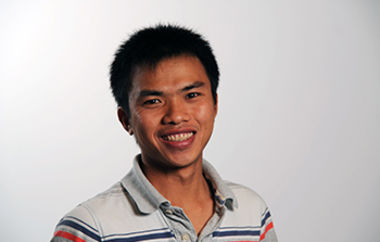PhD in Materials Chemistry
Current position: Founding Faculty, Fulbright University Vietnam
Research focus: molecular assembly and charge transport in organic electronic and biomedical devices
In previous research, Hung focused on wastewater treatment, especially desalination, which contributes to assuring a sustainable municipal and industrial water supply and helps terminate disease and deaths related to unsafe water.
2016 Best Poster Award ICSM2016 Conference, China
2016 Mananya Tantiwiwat Fellowship Award, University of Santa Barbara, United States of America
2015 UCSB Dissertation Fellowship, United States of America
CV as submitted for the Green Talents award (2010):
Gwangju Institute of Science and Technology, Korea
Research focus: water and wastewater treatment – desalination and photovoltaic
Vietnamese scientist Phan Vu Xuan Hung began his career at the Hanoi University of Science in Vietnam with a Bachelor of Science (Honours) in Chemistry. Then, he moved to Korea where he earned a Master of Science in Environmental Engineering at the Gwangju Institute of Science and Technology (GIST), while working as a research assistant at the Department of Environmental Science and Engineering.
During his studies in Vietnam, he won numerous awards, among them a full scholarship plus a certificate of merit for excellent students. At present, Mr Phan participates as a researcher in the SEAHERO (Seawater Engineering & Architecture of High Efficiency Reverse Osmosis) Project at the Center for Seawater Desalination Plant at the Gwangju Institute of Science and Technology in Korea.
For the past five years, Mr Phan has been studying and working in water and wastewater treatment, especially desalination, which contributes to assuring a sustainable municipal and industrial water supply and helps terminate disease and deaths related to unsafe water. Desalination using so-called reverse osmosis works much like filtration: The salt water gets pressed through a membrane, which holds back larger molecules and ions – and salt. One challenge of this method is organic fouling, the accumulation of micro-organisms, plants, algae or animals on the membrane. Mr Phan has been investigating ways of dealing with the organic fouling mechanism of reverse osmosis membranes on the molecular level.
Among the reasons for Mr Phan’s selection, the jury noted his scientific achievements in the development of osmosis membranes for the purification of seawater. Also contributing to the jury’s decision was the fact that his scientific work is characterised by the combination of chemical-analytical and model-based approaches. In a world with increasing population pressures and demands on a limited fresh water supply, the importance of an energy-efficient method for water desalination is obvious.
Mr Phan sees the Green Talents Forum as a chance both to initiate additional collaboration with leading German research centres in membrane-based water treatment and to learn more about photovoltaic. Such solar-cell research will be the focus of his studies while pursuing his PhD.
“I’d like to seize this opportunity and broaden my understanding of how Germany manages to meet so much of its domestic demand through renewable energy sources”, he says.






